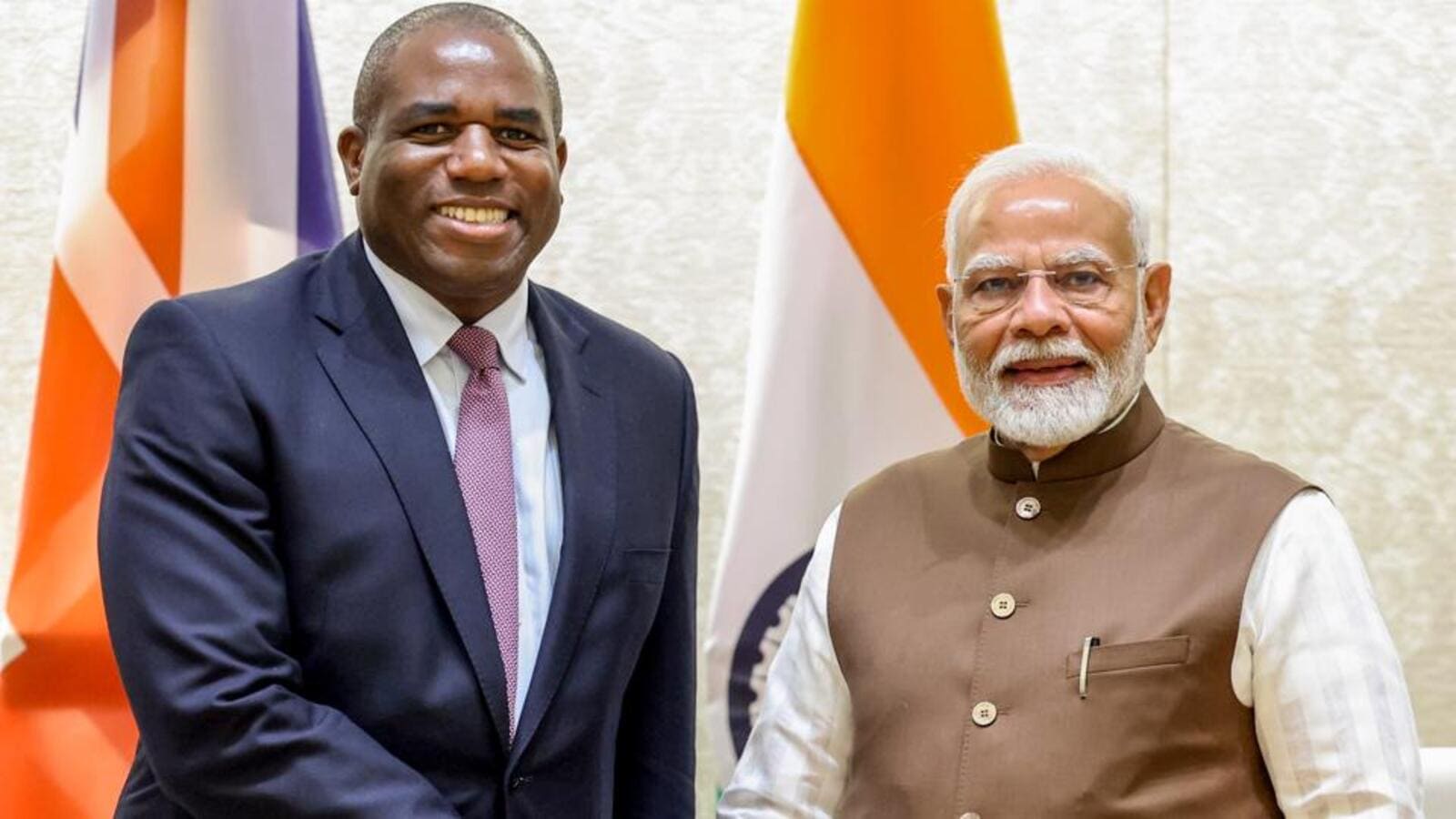India and the UK on Wednesday launched a Technology Security Initiative aimed at ensuring telecommunications security and collaboration in key areas such as critical minerals, semiconductors, artificial intelligence, quantum computing and health technology.
The launch of the initiative was announced following visiting UK foreign secretary David Lammy’s meetings with Prime Minister Narendra Modi, National Security Adviser (NSA) Ajit Doval and external affairs minister S Jaishankar. As in the case of a similar initiative with the US, the India-UK Technology Security Initiative will be coordinated by the NSAs of the two countries.
The Technology Security Initiative will refresh and deepen the India-UK comprehensive strategic partnership, focusing on boosting economic growth in both countries. The initiative was agreed by the Indian and UK NSAs following negotiations between both countries to expand collaboration in critical and emerging technologies across priority sectors, officials said.
The collaboration under this initiative will include government, the private sector, academia and research and development institutions.
Jaishankar and Lammy, during their meeting, reviewed the Roadmap 2030 for bilateral relations and expressed satisfaction at the progress achieved so far. They also agreed to look at renewing the roadmap to heighten the ambition for bilateral cooperation, the external affairs ministry said.
Both sides agreed to finalise details for the renewal of the roadmap in line with contemporary realities in a time-bound manner to intensify bilateral collaboration in priority areas such as trade, investment, defence, security, migration and mobility, information technology, artificial intelligence and technology, science and technology, innovation, and green energy.
India and the UK also appreciated the “substantial progress” made in negotiations for a free trade agreement (FTA) and “looked forward to its early conclusion to achieve a mutually beneficial” trade deal, the external affairs ministry said.
The two sides further agreed to deepen defence and security cooperation in the Indo-Pacific region and beyond, and to enhance capacities to address “growing threats from non-state actors”, the ministry said.
Jaishankar and Lammy also discussed regional and global issues of mutual interest, including the Russia-Ukraine conflict, the situation in West Asia and the Red Sea, the Commonwealth and the UN Security Council.
A joint fact sheet on the Technology Security Initiative said the move is aimed at elevating the India-UK strategic partnership to the next level. The initiative builds on the cooperation agenda set out in the Roadmap 2030 and will bring into sharper focus collaboration in critical and emerging technologies. It will also reinforce existing collaborative efforts in various technologies, broaden the mandates of existing mechanisms, and establish new mechanisms for cooperation.
Besides the Technology Security Initiative with the UK, India has the initiative on Critical and Emerging Technology (iCET) with the US and the Trade and Technology Council with the European Union. All three initiatives are aimed at setting standards and collaborating in research on cutting edge technologies.
Under the Technology Security Initiative, India and the UK will build an enhanced “Future Telecoms Partnership” that will focus on joint research, including on open radio access network (open RAN) systems, testbed linkups, telecoms security, spectrum innovation, software and systems architecture.
In the field of critical minerals, India and the UK will expand collaboration and policy exchanges on their critical mineral strategies and jointly work to improve supply chain resilience, explore research and development and technology partnerships in the complete critical minerals value chain and develop a roadmap for cooperation.
In the semiconductors sector, the two sides will work towards a broad partnership that leverages their individual strengths and explore mutually beneficial research and development focused on supply chain resilience, skills exchanges and hardware security. They will also facilitate academic and industrial collaboration, including in chip design, compound semiconductors and advanced packaging.
In the field of artificial intelligence, India and the UK will work towards “safe, responsible, human-centric and trustworthy AI” that can promote global good and strengthen interoperability between their AI governance frameworks. They will also work together in multilateral forums such as the G20, Global Partnership on AI and the United Nations.
In the realm of quantum computing, the two sides will establish a high-level dialogue to gain in-depth understanding of their respective national quantum strategies, and to shape the contours of future research and industry and collaboration opportunities.
India and the UK will strengthen biotechnology cooperation and launch a high-level partnership on engineering biology to share knowledge and help facilitate research advances. They will also establish a high-level dialogue on advanced materials to identify specific research and development collaboration on materials and composites.
A readout from the UK side said the two countries also agreed on closer collaboration on tackling climate change, accelerating the green energy partnership on offshore wind and green hydrogen, and unlocking green growth opportunities.
The readout said the Technology Security Initiative outlines a “bold new approach” for the UK and India to work together on the “defining technologies of this decade” such as telecoms, critical minerals, AI, quantum and semiconductors. “This will drive forward a bilateral partnership that is framed on boosting economic growth, deepening cooperation across key issues including trade, technology, education, culture and climate,” it added.
A new £7-million funding call for future telecoms research was announced by the UK Research and Innovation (UKRI) and India’s Department of Science and Technology.
Lammy said: “This [UK] government will put growth at the heart of our foreign policy. That’s why three weeks into the job, I am in Delhi announcing a new Technology Security Initiative to deliver on the promise of the UK-India relationship.”

